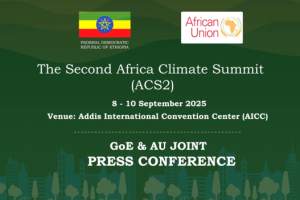
BY EPHREM ANDARGACHEW
Human activities affect water bodies which in turn affect the biodiversity of the world. Hence, biodiversity maintenance is considered one of the most important activities for ecosystem service retention. Because the ultimate challenge nowadays is the protection of freshwater biodiversity.
Indeed, water pollution has been a universal challenge for both developed and developing countries. While the quest for water quality is a question for everyone, water conservation and distribution, bad dealing with wastewater resulted in severe problems in many countries, worsening the water crisis all over the world.
Water quality pollution issues are among the major challenges that the world is facing nowadays. Aquatic pollution is considered a great problem facing freshwater and marine environments; it causes negative impacts on human health in addition to other respective organisms.
Pollution affects aquatic species’ immune systems either directly or indirectly by altering water quality. There are many sources of aquatic pollutants such as industrial wastes, agriculture runoffs in addition to municipal sewage that is dumped in the river, gradually transferring water to be ineligible for human consumption.
Besides, agricultural wastewater contains many pollutants from herbicides and pesticides that have negative impacts on the river and people using its water. Industrial effluents are highly toxic, including toxic heavy metals that may combine with suspended solids found in domestic wastewater from the muck.
Ethiopia is part and parcel of the world and the cost of water pollution is on the rise which causes losses and reduced biological diversity, and aesthetic, recreational, cultural, and archaeological values. Because the country’s water bodies receive considerable amounts of pollutants by way of sewage, industrial and domestic wastewater, and solid waste from land-based activities. They are either released directly to the sea or are conveyed through rivers, lagoons, and estuaries.
Hence, in order to save and protect the water bodies of the country, it is imperative to prepare regulations that protect and conserve river basins and sources of water nationwide. Ethiopian Minister of Water and Energy Dr. Eng. Habtamu Itefa said that guidelines for conserving and developing river basins are in the pipeline since industrial and factory chemicals threaten the biodiversity of the country.
According to him, chemical substances that are released into water bodies and great lakes are polluting and endangering the biodiversity of the nation, and the great lakes and rivers are polluted by the chemical that is released from factories.
The minister further stated that the situation reaches a critical level where the biodiversity of the nation is at stake these days due to the irresponsible move of the riverside development agents. One of the main dangers of this is water hyacinth weed expansion on Lake Tana and the effect is seen on the lake for two years, the same thing is happening at Koka dam and Lake Batu this time.
“The chemical that is released into the river has a huge impact on the nation’s biodiversity and institutions have to exert utmost effort to reduce such a daunting risk. Besides, everyone should be conscious of chemicals whether they are released into or are not released into the river.” To benefit urban and rural areas from drinking water, it is better to dig the deepest wells to easily get the water as river basins are not developed properly yet, he explained.
The increased industrialization in urbanization has been reducing the availability of clean water. This as a result becomes a great concern to the aquatic organism, plants, humans, and climate and changes the ecosystem. Therefore, the preservation of water and aquatic resources must be the content of all sectors.
Furthermore, effective wastewater treatment has the tendency of salvaging the water bodies. Integration of environmental policies into the actor firm’s core objectives coupled with continuous periodical enlightenment on the present and future consequences of water pollution will greatly assist in conserving the water environment.
Therefore, the ministry has prepared regulations regarding the conservation and development of river basins and sources of water nationwide. “What we are left with is the relevant body’s approval. Until then we will do awareness creation. The places where sources of water are located should be given ownership title deeds and need to be ruled by law. The society should protect rivers and lakes from contamination,” Habtamu remarked.
Indeed, water pollution may consist of chemicals introduced into the water bodies as a result of various human activities. Any amount of those chemicals pollute the water, regardless of the harm they may pose to human health and the environment. Along with the existing regulation, policies should be in place to ensure and control water pollution at the national level.
THE ETHIOPIAN HERALD SUNDAY EDITION 25 DECEMBER 2022




